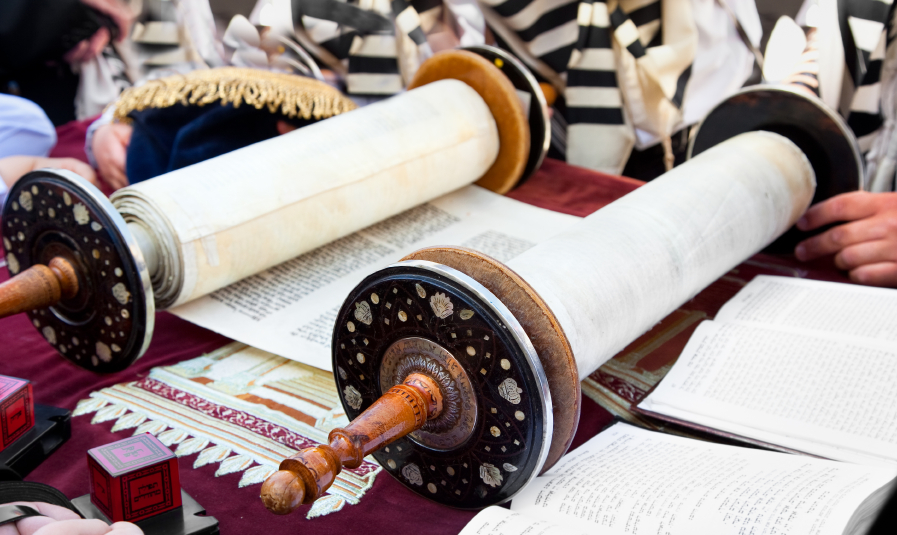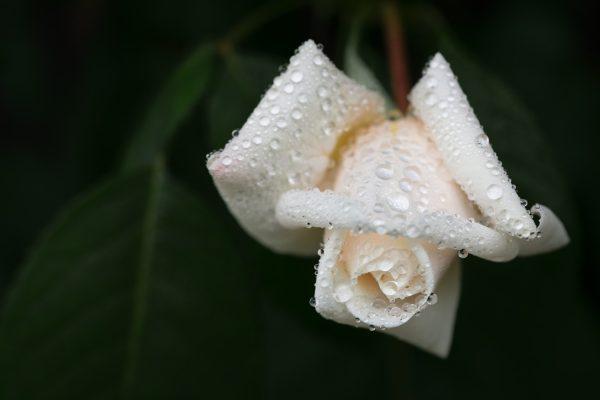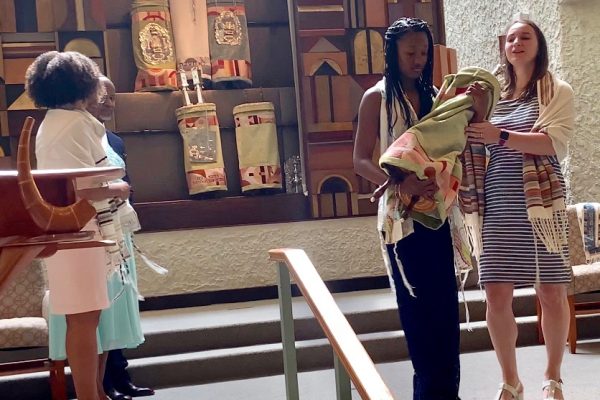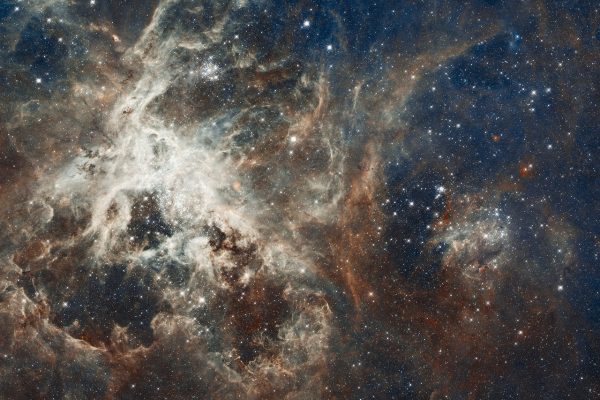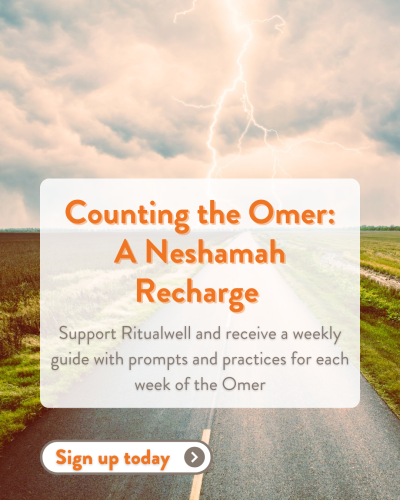Since Hebrew is a gendered language, all words are grammatically rendered either feminine or masculine. In the Torah, and also in “traditional” blessings and prayers, most words referring to God are written in masculine formulations. Chanting blessings and prayers using feminine names for God—and also re-gendering the Hebrew grammar from masculine into feminine constructs—can offer a more balanced Jewish prayer practice and expansive sense of the Divine.
Words can reveal a portal through which to contemplate the many expressions and attributes of God. The name Shekhinah reveals the Divine feminine Indwelling Presence residing in our midst; the word Yah, a shortened form of YHVH, conveys a personal closeness with God; and Eloteinu Ruakh ha’Olam conjures the ethereal Spirit of the World (ruakh also translates as wind or breath).
I chanted the Torah and Haftarah blessings using feminine God language and re-gendered Hebrew at my synagogue, Congregation B’nai Jeshurun in New York City, on Shabbat Chanukah, 30 Kislev, 5783, December 24, 2022. In this live footage, I am singing the traditional melodies that are heard in most Ashkenazi Jewish communities. In addition, this version of the Haftarah blessings recognizes and honors the neviot, the female prophetesses in our Jewish lineage. The Hebrew text is by Rabbi Jill Hammer, co-founder of Kohenet Hebrew Priestess Institute, used by permission. I translated the English text.
Whereas I chanted the entire text in the feminine, the traditional version can be modified by chanting every other paragraph, or just one section, or even just a few Hebrew words in the feminine. When you stand before the open Torah scroll to receive your aliyah, it is customary to touch the parchment with your tallit and then to kiss your tallit, bringing the sacred words close to you and making them your own.
Blessings chanted before Torah reading
1. Before the Torah is read, the person receiving an aliyah chants:
Barkhu et Adonai ha’mevorakh.
Blessed is Adonai the Blessed One.
2. Congregation responds:
Barukh Adonai ha’mevorakh le’olam va’ed.
Blessed is Adonai the Blessed One, forever.
3. The person receiving an aliyah continues chanting:
בְּרוּכָה אַתְּ שְׁכִינָה אֱלֹתֵינוּ רוּחַ הָעוֹלָם
אֲשֶׁר בָּחְרָה בָּנוּ עִם כָּל הָעַמִּים
.וְנָתְנָה לָנוּ אֶת תּוֹרָתָהּ
.בְּרוּכָה אַתְּ שְׁכִינָה נוֹתֶנֶת הַתּוֹרָה
Barukh Adonai ha’mevorakh le’olam va’ed.
Berukhah At Shekhinah Eloteinu Ruakh ha’Olam
asher bakhrah banu im kol ha’amim
ve’natnah lanu et Toratah.
Berukhah At Shekhinah notenet ha’Torah.
Blessed is Adonai the Blessed One, forever.
Blessed are You, Shekhinah, Indwelling Presence, Spirit of the World,
who has chosen us among all peoples, giving us Your Torah.
Blessed are You, Shekhinah, who gives the Torah.
4. The Torah is read.
Blessings chanted after Torah reading
5. After the Torah is read, the person receiving an aliyah chants:
בְּרוּכָה אַתְּ שְׁכִינָה אֱלֹתֵינוּ רוּחַ הָעוֹלָם
אֲשֶׁר נָתְנָה לָנוּ תּוֹרַת אֶמֶת
.וְחַיֵּי עוֹלָם נָטְעָה בְּתוֹכֵנוּ
.בְּרוּכָה אַתְּ שְׁכִינָה נוֹתֶנֶת הַתּוֹרָה
Berukhah At Shekhinah Eloteinu Ruakh ha’Olam
asher natnah lanu Torat emet
ve’khayei olam nat’ah betokheinu.
Berukhah At Shekhinah notenet ha’Torah.
Blessed are You, Shekhinah, Indwelling Presence, Spirit of the World,
who has given us a teaching of truth
and planted eternal life within us.
Blessed are You, Shekhinah, who gives the Torah.
Blessings chanted before Haftarah reading
.בְּרוּכָה אַתְּ שְׁכִינָה אֱלֹתֵינוּ רוּחַ הָעוֹלָם אֲשֶׁר בָּחְרָה בְּנְבִיאוֹת טוֹבוֹת וְרָצְתָה בְדִבְרֵיהֶן הַנֶּאֱמָרִים בֶּאֱמֶת
.בְּרוּכָה אַתְּ יָה הַבּוחֶרֶת בַּתּורָה וּבְמשֶׁה עַבְדָּה וּבְיִשְׂרָאֵל עַמָּה וּבִנְבִיאֵי הָאֱמֶת וָצֶּדֶק
Berukhah At Shekhinah Eloteinu Ruakh ha’Olam asher bakhrah be’neviot tovot, v’ratztah ve’divreihen ha’ne’emarim b’emet.
Berukhah At Yah ha’bokheret ba’Torah u’ve’Moshe avdah, u’ve’Yisrael amah, u’vinevi’ei ha’emet va’tzedek.
Blessed are You, Shekhinah, Indwelling Presence, Spirit of the World, for choosing worthy prophetesses who spoke honest, truthful and pleasant words.
Blessed are You, Yah, who chose the Torah, Your servant Moses, Your people Israel and the prophetesses of truth and righteousness.
Blessings chanted after Haftarah reading
בְּרוּכָה אַתְּ שְׁכִינָה אֱלֹתֵינוּ רוּחַ הָעוֹלָם צוּר כָּל הָעולָמִים צַדִּיקָה בְּכָל הַדּוֹרוֹת.
הָאֵלָה הַנֶּאֱמָנָה הָאוֹמֶרֶת וְעוֹשָׂה הַמְדַבֶּרֶת וּמְקַיֶּמֶת שֶׁכָּל דְּבָרֶיהָ אֱמֶת וָצֶדֶק.
נֶאֱמָנָה אַתְּ הִיא ה’ אֱלֹתֵינוּ וְנֶאֱמָנִים דְּבָרָיִךְ וְדָבָר אֶחָד מִדְּבָרָיִךְ אָחוֹר לֹא יָשׁוּב רֵיקָם.
כִּי אֵלָה מַלְכָּה נֶאֱמָנָה וְרַחֲמָנָה אָתְּ. בְּרוּכָה אַתְּ שְׁכִינָה הָאֵלָה הַנֶּאֱמָנָה בְּכָל דְּבָרֶיה.
רַחַמִי עַל צִיּון כִּי הִיא בֵּית חַיֵּינוּ וְלַעֲלוּבַת נֶפֶשׁ תּושִׁיעִי בִּמְהֵרָה בְיָמֵינוּ.
בְּרוּכָה אַתְּ יָה מְשָׂמַּחַת צִיּון בְּבָנֶיהָ.
שָׂמְּחִנוּ ה’ אֱלֹתֵינוּ בְּאֵלִיָּהוּ הַנָּבִיא עַבְדֵּךְ וּבְמַלְכוּת בֵּית דָּוִד מְשִׁיחֵךְ.
בִּמְהֵרָה יָבוֹא וְיָגֵל לִבֵּנוּ. עַל כִּסְאוֹ לא יֵשֵׁב זָר וְלֹא יִנְחֲלוּ עוֹד אֲחֵרִים אֶת כְּבוֹדוֹ.
כִּי בְשֵׁם קָדְשֵׁךְ נִשְׁבַּעְתּ לוֹ שֶׁלֹּא יִכְבֶּה נֵרוֹ לְעוֹלָם וָעֶד. בְּרוּכָה אַתְּ שְׁכִינָה מָגֵן דָּוִד.
עַל הַתּורָה וְעַל הָעֲבודָה וְעַל הַנְּבִיאוֹת וְעַל יום הַשַּׁבָּת הַזֶּה שֶׁנָּתַתְּ לָנוּ ה’ אֱלֹתֵינוּ לִקְדֻשָּׁה וְלִמְנוּחָה לְכָבוד וּלְתִפְאָרֶת. עַל הַכּל ה’ אֱלֹתֵינוּ אֲנַחְנוּ מודִים לָךְ וּמְבָרְכִים אותָךְ. יִתְבָּרַךְ שִׁמֵךְ בְּפִי כָּל חַי תָּמִיד לְעולָם וָעֶד. בְּרוּכָה אַתְּ שְׁכִינָה מְקַדֶּשֶׁת הַשַּׁבָּת.
Berukhah At Shekhinah Eloteinu Ruakh ha’Olam tzur kol ha’olamim, tzadikah be’khol ha’dorot. Ha’Elah ha’ne’emanah ha’omeret ve’osah ha’medaberet u’mekayemet shekol de’vareiha emet va’tzedek.
Ne’emanah At Hi Adonai Eloteinu ve’ne’emanim de’varai’ikh ve’davar ekhad mi’de’varai’ikh akhor lo yashuv reikam. Ki Elah Malkah ne’emanah ve’rakhamanah At. Berukhah At Shekhinah ha’Elah ha’ne’emanah be’khol de’varei’ha.
Rakhami al Tziyon ki hi beit hayeinu ve’la’aluvat nefesh toshi’i bimheira ve’yameinu. Berukhah At Yah me’samakhat Tziyon be’vaneha.
Samkhinu Adonai Eloteinu be’Eliyahu ha’navi avdekh u’ve’malkhut Beit David meshikhekh. Bimherah yavo v’yageil libenu. Al kiso lo yeshev zar ve’lo yinkhalu od akherim et kevodo. Ki ve’shem kodshekh nishbat lo shelo yikhbeh neiro l’olam va’ed. Berukhah At Shekhinah, Magen David.
Al ha’Torah ve’al ha’avodah ve’al ha’neviot ve’al yom ha’Shabbat ha’zeh she’natat lanu Adonai Eloteinu li’kedushah ve’limenukhah le’khavod u’le’tifaret. Al ha’kol Adonai Eloteinu anakhnu modim Lakh u’mevarkhim Otakh, yitbarakh shimekh be’fi kol chai tamid le’olam va’ed. Berukhah At Shekhinah mekadeshet ha’Shabbat.
Blessed are You, Shekhinah, Indwelling Presence, Spirit of the World, abiding Protectress, Righteous One for all generations, Faithful One, whose words are spoken and fulfilled by truthful and just actions.
Faithful are You, Adonai, Source of Life, and Your words are trustworthy and fulfilled. You are regal, constant and compassionate. Blessed are You, Shekhinah, faithful in all Your words.
Show compassion to Zion, the foundation of our life. Bring wholeness to those humbled in spirit, without delay. Blessed are You, Yah, who brings happiness to Zion through her children.
Bring us joy, Adonai, Compassionate One, with the Prophet Elijah and the realm of the House of David. May redemption come soon, making our hearts rejoice within this sacred place of honor and light. Blessed are You, Shekhinah, Guardian of David.
For the Torah, for prayer, for the prophetesses and for this Shabbat day that You have given us, we offer gratitude and blessings to You, Adonai, Abundant One, for holiness, rest, honor and harmony. For all of this, Adonai, Source of Life, may Your name be blessed by all beings, always. Blessed are You, Shekhinah, who sanctifies Shabbat.
Translation by Lori Sumberg
MA Jewish Studies, Jewish Theological Seminary

